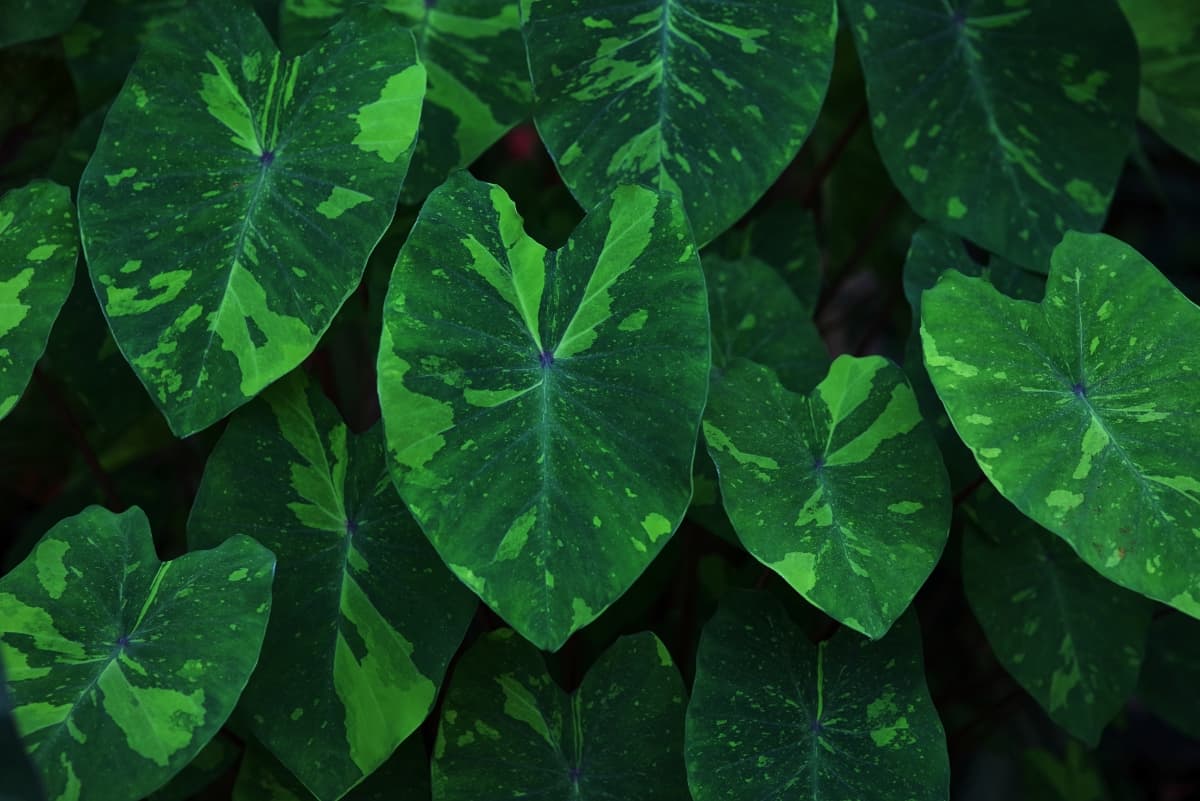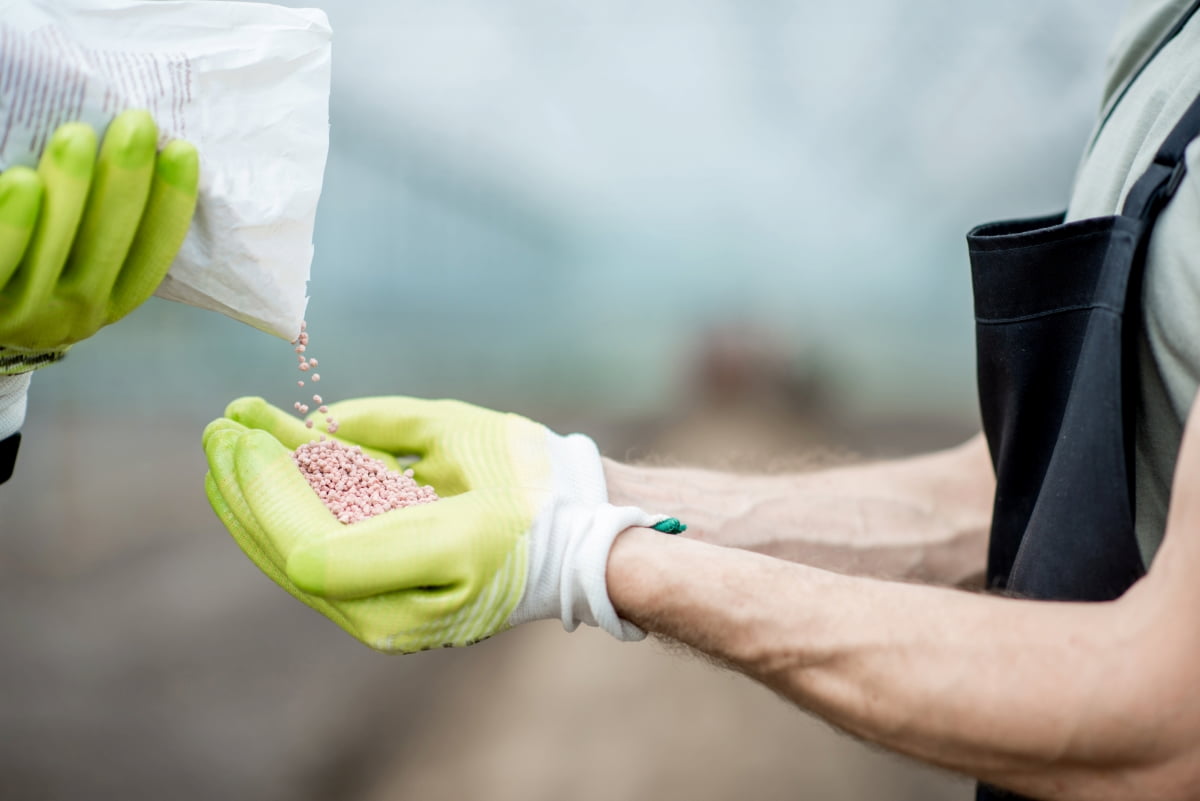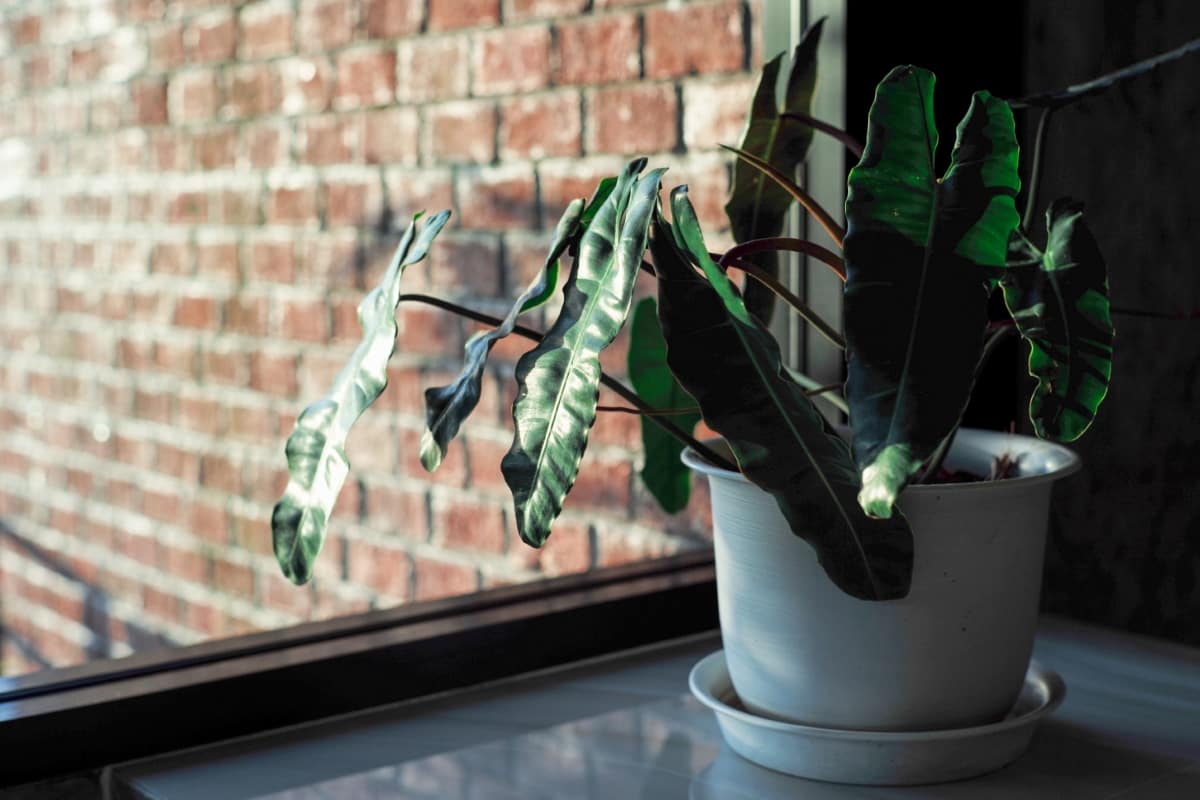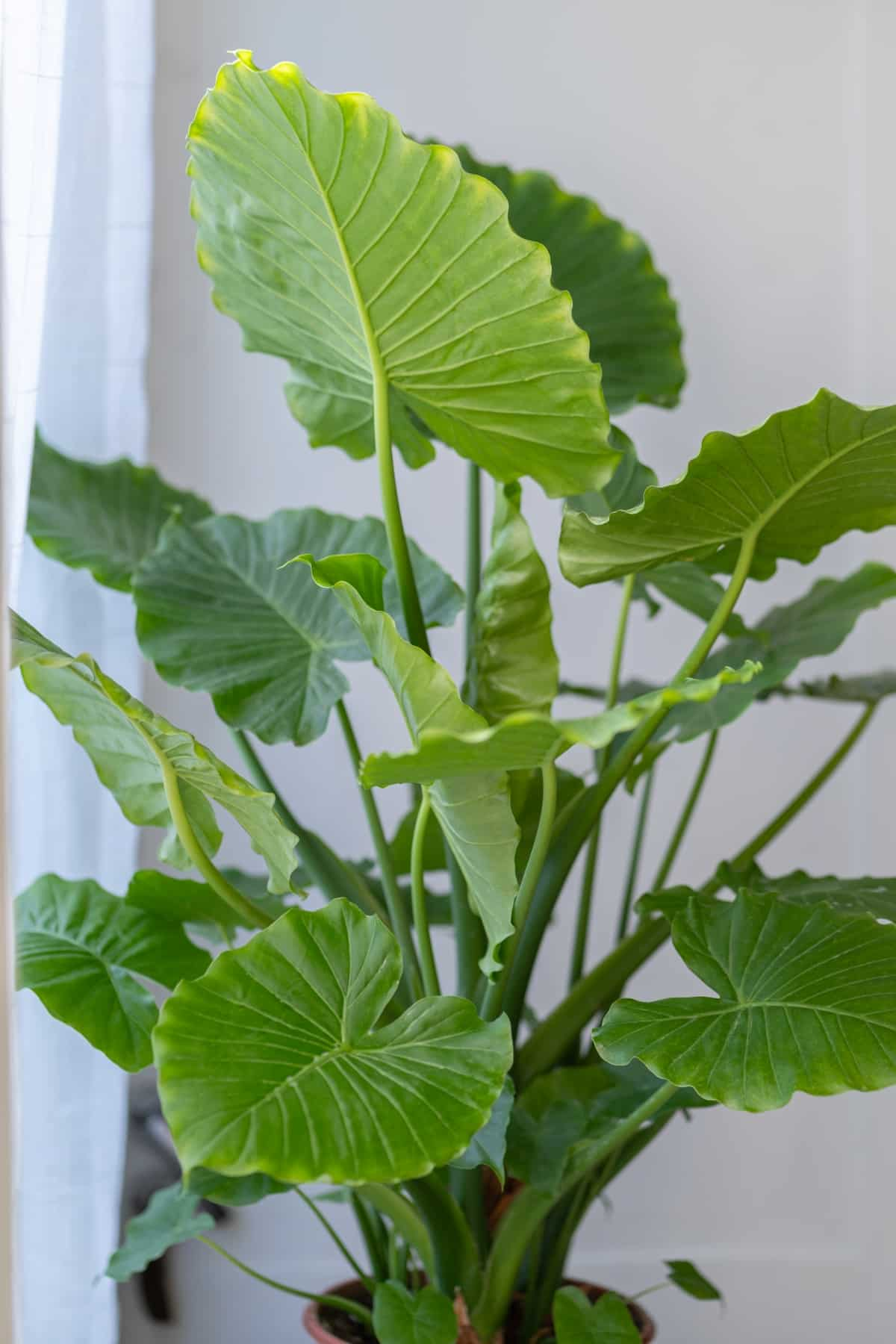Growing Elephant Ears is a rewarding experience that brings the beauty of tropical foliage into your home. With their vibrant colors, these large-leaved plants create an exotic atmosphere wherever they are placed. Like many other houseplants, Elephant Ears can improve air quality.

Understanding the Nutritional Needs of Indoor Elephant Ears
To keep your indoor Elephant Ears thriving, it’s crucial to understand their nutritional needs. These tropical plants require a balanced diet to support their oversized leaves and promote healthy growth. What kind of fertilizer do Elephant Ears like? One key nutrient that Elephant Ears need is nitrogen. Nitrogen helps in boosting leaf development and overall plant vigor. Phosphorus is another essential element that aids in root growth and flower production. Potassium plays a vital role in maintaining strong stems and enhancing disease resistance.
When selecting fertilizers for your indoor Elephant Ears, look for options with a balanced NPK ratio, like 20-20-20 or 20-10-20. These ratios ensure an equal distribution of nitrogen, phosphorus, and potassium to meet the plant’s specific needs. In addition to commercial fertilizers for Elephant Ears, you can opt for homemade or natural alternatives. Homemade options like compost tea or banana peel-infused water provide organic nutrients that promote soil health without harmful chemicals.
Homemade and Best Fertilizer for Indoor Elephant Ears
One popular homemade fertilizer for Elephant Ears is banana peel tea. Soak banana peels carefully in water for a few days, then strain the liquid and dilute it with water before using. The potassium-rich liquid will provide essential nutrients to your Elephant Ear plants. Another homemade fertilizer option is coffee grounds.
These can be sprinkled around the base of your plants or mixed into the soil to add nitrogen and other beneficial nutrients. Just be sure not to overdo it, as too much coffee grounds can make the soil too acidic. Compost is also an excellent choice for feeding indoor Elephant Ears. Composting kitchen scraps, leaves, and other organic matter can create nutrient-rich soil supporting healthy plant growth.
Natural Fertilizers for Indoor Elephant Ears
One excellent natural fertilizer for Elephant Ears is compost. Compost is from organic matter like kitchen scraps, yard waste, and leaves. It’s a rich source of essential nutrients that can feed your Elephant Ears while improving soil structure and drainage. Another natural fertilizer option is fish emulsion.
In case you missed it: How to Apply 14-14-14 Fertilizer: Nutrient Composition, Uses, and Benefits

Made from decomposed fish parts, this liquid fertilizer boosts nitrogen, phosphorus, and potassium – vital for healthy plant growth. If you’re looking for an all-purpose organic fertilizer for your indoor Elephant Ears, consider using seaweed extract or kelp meal. These products contain trace minerals and growth hormones that promote strong root development and lush foliage.
Information About Growing Elephant Ears
| Common Name | Elephant Ears |
| Plant type | Bulb, Houseplant |
| Light | Part Sun |
| Foliage color | Blue/Green |
| Plant Type | Tropical perennial |
| Sun Exposure | Full sun to part shade |
| Soil Type | Moist |
| Soil pH | Acidic (5.5 to 7.0) |
| Special features | Good for Containers, Low Maintenance |
Organic Fertilizers for Indoor Elephant Ears
Organic fertilizers offer a natural and eco-friendly way to nourish your indoor Elephant Ears. These fertilizers are derived from organic materials, such as compost, manure, or plant-based ingredients. They provide essential nutrients while promoting soil health and sustainability. One popular organic fertilizer for Elephant Ears is compost tea.
It’s made by steeping compost in water to make a nutrient-rich liquid that can be used as a foliar spray or soil drench. This helps deliver nutrients directly to the roots of your Elephant Ears. Another great choice is seaweed extract, which contains beneficial minerals and trace elements that enhance growth and plant health. Dilute it with water according to the instructions on the product label and apply it regularly.
For those who prefer homemade solutions, you can make an organic fertilizer using banana peels. They release potassium and other micronutrients that promote strong growth as they decompose. Worm castings are a fantastic source of organic matter for indoor plants like Elephant Ears. These castings are rich in nutrients like nitrogen, phosphorus, and potassium, which boost plant development naturally.
Liquid Fertilizers for Indoor Elephant Ears
Liquid fertilizers can be convenient and effective for feeding your indoor Elephant Ears. These fertilizers come in various forms, such as concentrated solutions or ready-to-use sprays, making them easy to apply directly to the soil or foliage of your plants. One popular type of liquid fertilizer for indoor Elephant Ears is fish emulsion. This organic fertilizer is derived from fish waste and has essential nutrients such as nitrogen, phosphorus, and potassium. It provides nourishment to your plants and helps improve soil fertility.
Another liquid fertilizer option is a seaweed extract. Packed with trace minerals and growth-promoting hormones, seaweed extract stimulates root development and enhances overall plant health. Mix it with water based on the instructions on the bottle and apply it to your Elephant Ear plants regularly. Liquid fertilizers are known for their quick absorption by plants, allowing nutrients to be readily available for uptake. They provide an immediate boost of nutrition that can help support healthy leaf growth in your indoor Elephant Ears.
NPK Ratio for Indoor Elephant Ears
The NPK ratio for Elephant Ears refers to the three essential nutrients: nitrogen (N), phosphorus (P), and potassium (K) that plants need for healthy growth. In the case of Elephant Ears, a balanced 20-20-20 fertilizer is recommended. The equal parts of nitrogen, phosphorus, and potassium in a 20-20-20 fertilizer provide a well-rounded nutrient profile for your indoor Elephant Ear plant.
In case you missed it: Benefits of Using 15-15-15 Fertilizer in Your Garden: When and How to Apply

Nitrogen promotes leafy growth and vibrant green foliage, while phosphorus encourages root development and overall plant health. Potassium plays a vital role in enhancing disease resistance and improving flower production. Alternatively, you can use a 20-10-20 fertilizer for your indoor Elephant Ears. This slightly lower phosphorus content still provides adequate nutrition while emphasizing leafy growth.
Elephant Ear Fertilizer 20-20-20
One popular option is the 20-20-20 fertilizer, which contains equal parts nitrogen, phosphorus, and potassium. This balanced ratio provides the essential nutrients your Elephant Ears need for healthy growth. Nitrogen is vital in leaf and stem development, while phosphorus promotes root growth and flower production. Potassium helps with plant health and disease resistance. With a 20-20-20 fertilizer, you can ensure that your Elephant Ears receive all these crucial elements equally.
An Elephant Ear fertilizer with this specific NPK ratio will help promote strong foliage growth and vibrant leaves. The nutrients are readily available in water-soluble form, making it easy for the plants to absorb them quickly. To use a 20-20-20 fertilizer on your indoor Elephant Ears, follow the instructions on the package for dilution rates and frequency of application. Applying every two to three weeks during the growing season will suffice.
Epsom Salt for Indoor Elephant Ear Plant
This readily available and affordable ingredient can do wonders for the health and growth of your plants. It is a naturally occurring mineral compound composed of magnesium and sulfate. These elements play crucial roles in plant nutrition and development. Magnesium helps with chlorophyll production, essential for photosynthesis and overall plant vitality. Sulfate aids in the uptake of nutrients from the soil, promoting better nutrient absorption.
To use Epsom salt on your indoor Elephant Ear plant, dissolve one tablespoon of Epsom salt in a gallon of water. Then, water your plant with this solution once every month during the growing season. Always follow proper dilution instructions when using any fertilizer or nutrient supplement on your plants. Overuse or improper application can potentially harm them instead of benefiting them.
How Often to Fertilize Indoor Elephant Ears?
Like many large-leaved tropical plants, Elephant Ears have high nutritional needs and are considered heavy feeders. To ensure their healthy growth and vibrant foliage, it is important to provide them with the right fertilizers regularly. A water-soluble, high-nitrogen fertilizer is ideal for indoor Elephant Ears. Applying this type of fertilizer every two to three weeks will supply them with the necessary nutrients to thrive. This consistent feeding schedule will help promote strong growth, lush leaves, and vibrant colors.
In case you missed it: Benefits of 19-19-19 Fertilizer: When and How to Apply for Lawns and Gardens

Conclusion
Elephant Ears thrive in high-humidity environments, meaning having them indoors can help increase moisture levels in dry spaces such as centrally heated or air-conditioned rooms. By understanding the nutritional needs of your indoor Elephant Ears and regularly providing them with proper fertilization, you can enjoy their striking beauty and impressive size in your home yEar-round.
- Feed Your Flock for Less: Top 10 Tips to Save on Chicken Feed
- Ultimate Guide to Ossabaw Island Hog: Breeding, Raising, Diet, and Care
- Hatching Answers: The Top 10 Reasons Your Chickens Aren’t Laying Eggs
- Eggs and Economics: Breaking Down the Cost of Raising Backyard Chickens
- Defend Your Greens: Proven Methods to Keep Iguanas Out of Your Garden
- Ultimate Guide to Cinnamon Queen Chicken: A Comprehensive Guide for Beginners
- Ultimate Guide to California Tan Chicken: Breeding, Raising, Diet, Egg-Production and Care
- Ultimate Guide to Marsh Daisy Chicken: Breeding, Raising, Diet, and Care
- 10 Types of Chicken Farming Businesses You Can Start for Profits